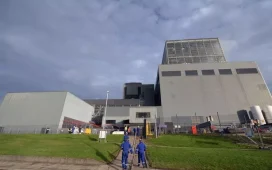Unlock the Editor’s Digest for free
Roula Khalaf, Editor of the FT, selects her favourite stories in this weekly newsletter.
The effort that goes into Britain’s swift and seamless transfer of power is visible in an Edwardian toilet in Whitehall, where the Treasury is preparing for the first female chancellor of the exchequer.
With Labour’s Rachel Reeves widely expected to succeed Jeremy Hunt next week, the Treasury facilities department has been discussing the chancellor’s private toilet, with a team of workers in high-vis jackets inspecting the facility.
“There has been a discussion about whether it’s appropriate to have a urinal in there and whether it should be removed,” said one Treasury insider.
Pictures seen by the Financial Times show a black-and-white tiled room with 13 boxes of period products placed neatly above the sink, which another Treasury insider said were only introduced during the course of the election campaign.


One Tory official claimed Labour was “taking the voters for granted”, adding: “Not only are they measuring the curtains but they are doing up the bathroom.”
However, the toilet planning is the work of the Treasury, not Labour. The Treasury declined to comment.
A spokesperson for Reeves said: “We are not doing a running commentary on toilet arrangements.”
Beyond the chancellor’s private bathroom, the expected transfer of power to Sir Keir Starmer’s party would be momentous in many ways.
The FT’s poll tracker gives Labour a 21-point lead over the Conservatives, suggesting it is on track for its first election victory since 2005. It would be the first time Labour have ousted the Tories since Tony Blair’s 1997 victory.
Even Rishi Sunak’s entourage have now started talking about the prime minister’s time in Number 10 in the past tense. “I think people will look kindly on his legacy,” said one close aide.
If Labour win on July 4, then Sunak and Hunt will move out of their homes at 10 and 11 Downing Street, respectively, the following day, in a transition which is both abrupt and astonishing to many foreign observers.

Jitters were building up among Conservative candidates in some of the party’s safest seats on Friday. One former minister claimed Liz Truss, a former Tory prime minister, is among those in trouble, in spite of her notional majority of 24,180. Truss declined to comment.
At the same time Labour’s policy teams have been carrying out a fresh round of access talks with senior civil servants to discuss policy implementation: “It’s hugely exciting,” said one aide.
But several candidates have told the FT that the Tory argument of “don’t give Labour a supermajority” has started filtering on to the doorsteps, giving some voters second thoughts. “Change will only happen if people vote Labour on July 4,” one senior Labour party figure said.
Ellesheva Kissin is a reporter at Banking Risk and Regulation, a service from FT Specialist









